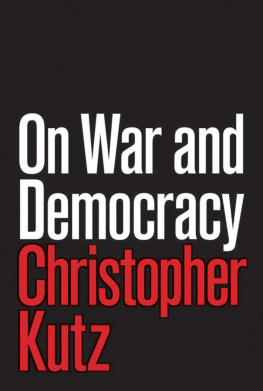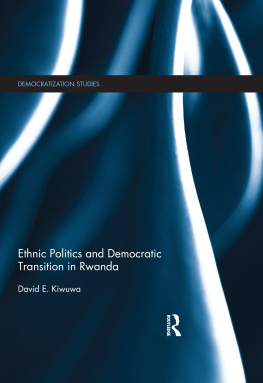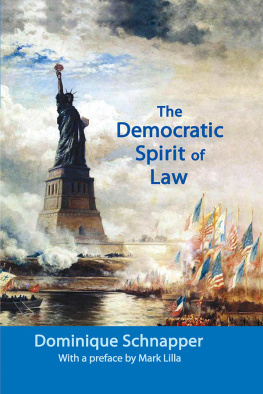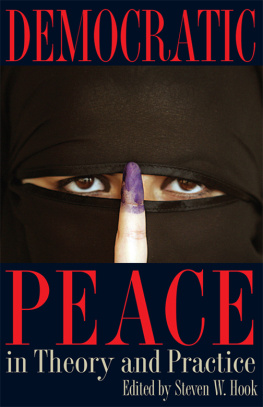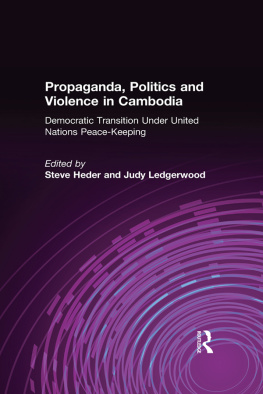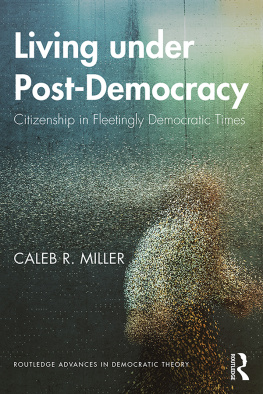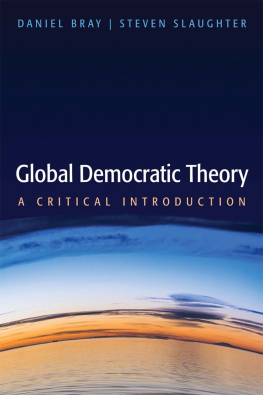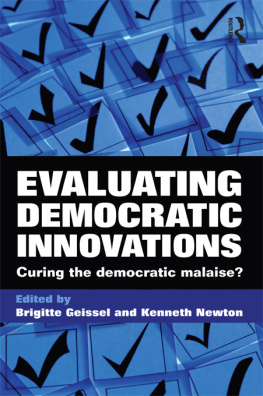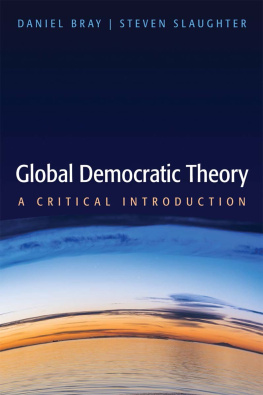
ON WAR AND DEMOCRACY
ON WAR AND DEMOCRACY
CHRISTOPHER KUTZ
PRINCETON UNIVERSITY PRESS
Princeton & Oxford
Copyright 2016 by Princeton University Press
Published by Princeton University Press
41 William Street, Princeton, New Jersey 08540
In the United Kingdom: Princeton University Press
6 Oxford Street, Woodstock, Oxfordshire OX20 1TW
press.princeton.edu
All Rights Reserved
Library of Congress Cataloging-in-Publication Data
Kutz, Christopher.
On war and democracy / Christopher Kutz.
pages cm
Includes bibliographical references and index.
ISBN 978-0-691-16784-8 (hardcover : alk. paper)
1. DemocracyPhilosophy. 2. WarMoral and ethical aspects. 3. Politics and war. 4. Agent (Philosophy). I. Title.
JC423.K87 2016
321.8dc23 2015018418
British Library Cataloging-in-Publication Data is available
This book has been composed in Granjon LT Std
Printed on acid-free paper.
Printed in the United States of America
1 3 5 7 9 10 8 6 4 2
For Oliver, Madeleine, and Jessica
CONTENTS
PERMISSIONS
The following chapters have appeared, in similar form, as published articles.
CHAPTER 2 Democratic Security, in Security: A Multidisciplinary Normative Perspective, ed. Cecilia Bailliet (Martinus Nijhoff, 2009).
CHAPTER 3 The Difference Uniforms Make: Collective Violence in Criminal Law and the Law of War, Philosophy and Public Affairs 33 (2005): 148180.
CHAPTER 4 Fearful Symmetries, in Just and Unjust Warriors, ed. David Rodin and Henry Shue (Oxford University Press, 2008).
CHAPTER 5 Against Political Luck, in Reading Bernard Williams, ed. Daniel Callcut (Routledge, 2009).
CHAPTER 6 Secret Law and the Value of Publicity, Ratio Juris 22 (2009): 197217.
CHAPTER 7 Torture, Necessity, and Existential Politics, California Law Review 95 (2007): 235176.
CHAPTER 8 Democracy, Defense and the Threat of Intervention, in The Morality of Defensive War, ed. Ccile Fabre and Seth Lazar (Oxford: Oxford University Press, 2014).
CHAPTER 11 Democratic Norm Death, Ethics & International Affairs (Winter 2014): 425449.
CHAPTER 12 Justice in Reparations: The Problem of Land and the Value of Cheap Talk, Philosophy & Public Affairs 32 (2004): 277312.
ACKNOWLEDGMENTS
I owe so many thanks to so many readers and interlocutors that it is difficult to know where to start. I am grateful to the University of California at Berkeley, which has been my chief intellectual home since 1998, and to my colleagues in the Jurisprudence and Social Policy Program. I continue to remark on the miracle of UC Berkeley: a public university that combines a commitment to democratic access with one to vaulting intellectual ambition. I am also grateful to Columbia and Stanford Law Schools, which were temporary homes during the books gestation, and Sciences-Po, Paris, where two marvelous years provided a crucial oblique view on many of my arguments. Audiences at Princeton, Yale, Vanderbilt, Oxford, Stanford, Delft, Toronto, and Osgoode Hall have all provided terrific commentary and criticism.
At the risk of forgetting many individuals, I would like to thank the following people for extremely constructive comments on talks or drafts: Charles Beitz, Gabriel Beringer, Mark Bevir, Peter Cane, Joshua Cohen, Ariel Colonomos, Richard Craswell, Meir Dan-Cohen, Tom Dannenbaum, Mary Dudziak, Ccile Fabre, Barbara Fried, Stephen Galoob, Michael Gross, Andrew Guzman, Kinch Hoekstra, Kate Jastram, Sanford Kadish, Paul Kahn, Niko Kolodny, Martin Krygier, Seth Lazar, David Lieberman, Katerina Linos, David Luban, Daniel Markovits, Larry May, Melissa McCall, Jeff McMahan, Jamie OConnell, Gloria Origgi, Robert Post, Eric Rakowski, Jessica Riskin, David Rodin, Samuel Scheffler, Scott Shapiro, Henry Shue, Jonathan Simon, David Sklansky, Sarah Song, Kevin Stack, Annie Stilz, Jerry Vildostegui, Jay Wallace, and Mikhail Xifaras. I am especially grateful to the members of this group who participated in a workshop on this manuscript in Fall 2014 at Berkeley, and to Sarah Song and Amatullah Alaji-Sabrie for organizing it. I owe special thanks to my deans and chairs at Berkeley, whose support made the book possible. I am further grateful to Amatullah Alaji-Sabrie and Kavitha Iyengar for invaluable help with final preparation of the manuscript.
I would like to mention several particular intellectual debts here. I owe one to Michael Walzer, whose book Just and Unjust Warsin its insistence that the problem of war be confronted simultaneously concretely, through lived and historical example, and abstractly, through philosophical reflectioninspires every page. (The pervasiveness of that influence is why specific footnotes are more scant.) The others are to two departed teachers and colleagues. First, Bernard Williamss voice echoed in my head throughout the writing of this book, in his insistence that philosophical thought must address life if it is to hope to be interesting. The second is Sandy Kadish, who more than anyone created at Berkeley Law a haven for philosophical thought about morality and law, and whose guidance, kindness, and generosity have been a model for me.
The people at Princeton University Press have been a pleasure to work with, including my editor, Rob Tempio, and my copyeditor, Molan Goldstein.
Finally, I owe my deepest thanks for all manner of advice and support to Allen Galson, Myra Jehlen, Karon Johnson, Robert Kutz, Ruth Kutz, Carl Riskin, and Jessica Riskin; and to Oliver and Madeleine Riskin-Kutz, who are the point of it all.
INTRODUCTION: WAR, POLITICS, DEMOCRACY
We live in an era of belligerent democracy, an unhappy sequel to the peaceful democratic transitions that unfolded across Latin America and Eastern Europe at the end of the twentieth century. Democratic aspirations are increasingly voiced across the Mediterranean in the new centuryleading more often than not to civil conflict rather than electoral transitions. We live also in an era of democratic wars, when democratic states pursue violent conflict in the name of peaceable ends, ranging from disarmament to democratization to securing access to natural resources.
Despite Churchills famous quipDemocracy is the worst form of government, except for all those other forms that have been tried from time to timedemocracy is seen as a source of both domestic and international flourishing. Democracy, understood roughly for now as a political system with wide suffrage in which power is allocated to officials by popular election, can solve or help solve a host of problems with stunning success. It can solve the problem of revolutionary violence that condemns autocratic regimes, because mass politics can work at the ballot box rather than the streets. It can help solve the problem of famine, because the systems of free public communication and discussion that are essential to democratic politics are the backbone of the markets that have made democratic societies far richer than their competitors. It can help solve the problem of environmental despoliation, which occurs when those operating polluting factories (whether private citizens or the state) do not need to answer for harms visited upon a broad public. And democracy has been famously thought to help solve the problem of war, in the guise of the idea of the peace amongst democratic nationsan idea emerging with Immanuel Kant in the Age of Enlightenment and given new energy with the wave of democratization at the end of the twentieth century.
The democratic peace thesis, which holds that mature democracies rarely fight each other, has been a comforting mainstay of political thought, especially in the United States. As a modern correlation, it has held up Democracy and war, it seems, are anything but adversaries. This is not news, especially in the United States. Indeed, the pro-democracy or freedom agenda of George W. Bushs neoconservatism came to be identified around the world as an expression of martial imperialism.
Next page
